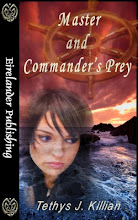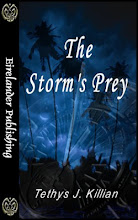"The dark alpha type..."
"The smarmy blonde villain..."
"Onyx eyes of passion and immortality..."
Stereotypes. In writing, they are everywhere. In our heroes, heroines and our villains. Even in the sub-characters.
But how do you know what kind of character to use? How do you decide how they look? How they act? Talk?
I might be a minority here, but I can't use real people as the inspiration for my characters. They usually come to me as their own people. Dark, light, short, tall. Rather than using (as an example) the expected norm such as all vampires are dark and brooding, I like to know a little bit about where they come from. Such as with Diego in The Eternal Kiss. He's a Spaniard. A warrior. A fighter. He's dark, fierce, commanding, but not because he's a vampire. Because of the man he was before he became a vampire. Those lessons piled on top of his condition make him doubly hard on the outside-or so it seems.
So how often do we use stererotypes? Considering the above, without knowing about the character, he sounds like several of the same vein (no pun intended) that we've all read. Alpha, dark, brooding, mysterious, a tad dominant.
Believe it or not, those traits belong as much to that character as to my own husband, although he's not quite so mysterious these days. Stereotypes are found in written fiction-but they are found just as much in real life. The mold of every character we write began as a kernal of some teeny bit of intriguing information and it was then layered like a delicate truffle dessert. Each layer bringing a new surprise, a new facet of that character.
Some authors know all those layers before they start to write. Some *cofmecof* don't. So while characters can and are often a shadow of a recognizable stereotype, they are just as likely a version of some person in real life. Which is where knowing real life habits, accents, quirks and interests (back to Z's post) can make a character come alive. And no matter how that one character came to be, we all want him to be "alive" for the story.
So the next book you read, or write, think about the characters. Think about people you know that share the same traits. Personalize the character and they will always be alive, and memorable.





.jpg)
.jpg)






4 comments:
Diana,
Yes, we really need to know our characters before we start writing about them. Sigh! I'm one of those writers who write by the seat of their pants, although, I've started doing character profiles.
You're right about stereotyping people as well as characters. Just because someone acts reserve doesn't mean they think they're better than anyone else. It just takes time for some people to open up. Just because you're a blonde doesn't mean you're dumb or evil or an angel. Just because you're a brunnette doesn't mean you're a witch. Just because you have pitted skin doesn't mean you are bad and so on and so on. lol
I'm with you Diana. My characters are not based on real people. They are their own person. I like my characters to have a back story. Where did they come from? What's their history? I have to know who they are before I can start writing their story.
Karen
Lol, Diana. You made me think of something a lot of writers (me included) are guilty of - people watching. Like, at the hairdresser, you see the lady who's well into her fifties but she dresses like a teenager and is having her hair cut/blow-dried/highlighted/treated/what else. Makes one immediately think man-eater when you see the gleam in her eye.
We all fall prey to stereotypes. But here's where we need to exert caution - a stereotype in writing gives you a cardboard cutout. and we all knwo that's definitely not what we want!
Personalizing characters, making them 'real' people, is what a big part of writing is all about.
Great post. Loved the poke towards reflexion.
Hugs
Z(Aasiyah/Nolwynn)
I totally agree -- why read a book if the characters aren't real for you. When I write, the first few chapters are usually for me -- my getting acquainted time with the character. I have a vague idea about some of the broad strokes, but the back story comes out as I start writing (I'm not a plotter, can you tell?) Of course, those chapters are never in the book, although bits and pieces will trickle through.
Post a Comment